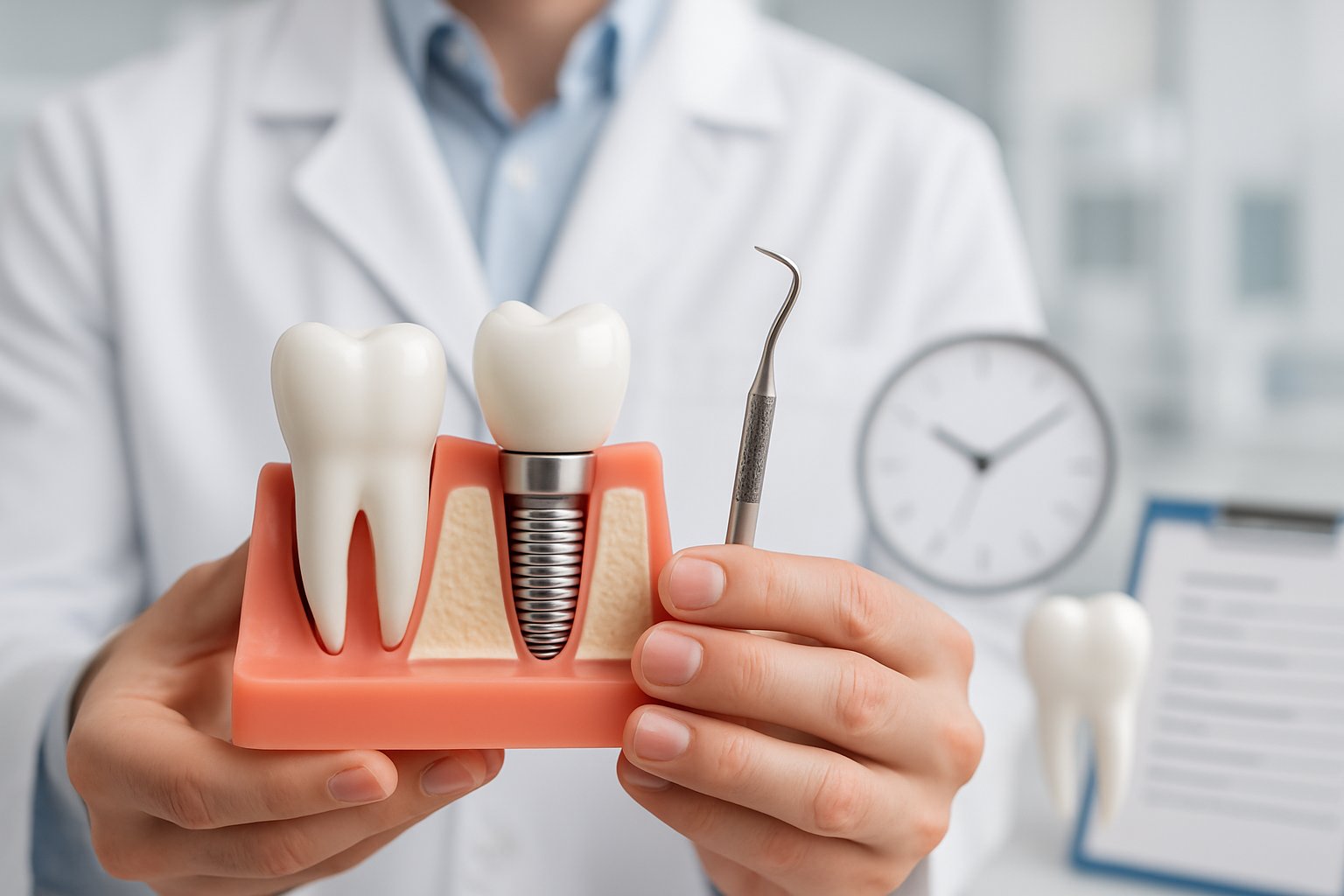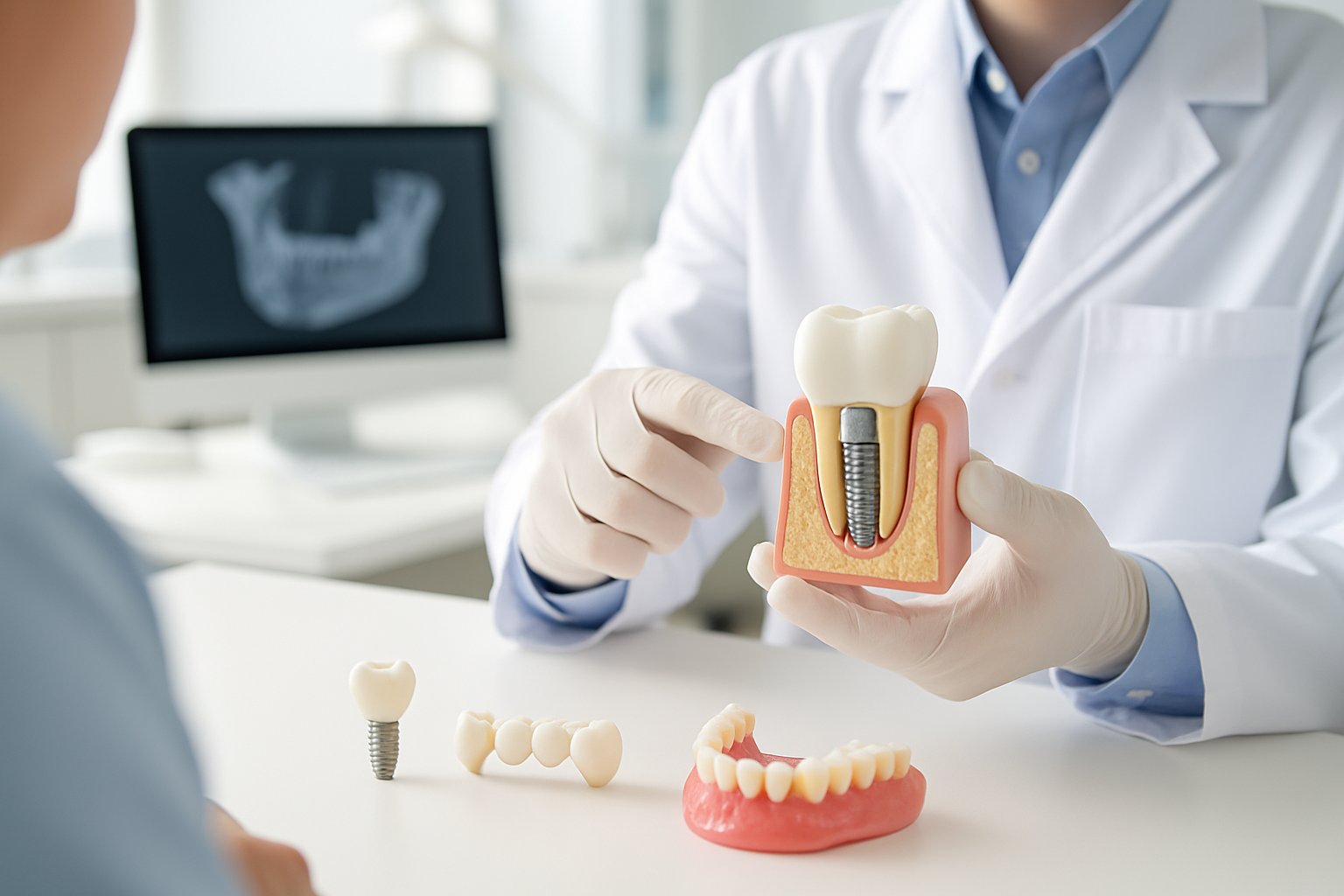How Long Do Dental Implants Last?
Dental implants offer one of the most durable tooth replacement options today. Many people wonder how long they last before investing in their oral health.

Most dental implants last 25 years or even a lifetime with proper care. Titanium posts anchor implants to your jawbone and serve as permanent fixtures. The crown or artificial tooth attached to the implant may need replacement after 10 to 15 years due to normal wear.
Several factors affect how long dental implants last. Your oral hygiene, overall health, and lifestyle choices all play important roles.
Key Takeaways
- Dental implants typically last 25 years or longer with proper care.
- Factors like oral hygiene and health conditions affect implant lifespan.
- Regular maintenance and dental visits help maximize implant durability.
How Long Do Dental Implants Last?

Dental implants usually last 20-25 years with proper care. Many remain functional for life.
The implant post often outlasts other components like the crown or abutment.
Average Lifespan of Dental Implants
Most dental implants last between 20 to 25 years. Studies show that 90-95% of implants remain stable after 10 years.
The titanium implant post can last a lifetime once it bonds with your jawbone. Osseointegration creates a permanent foundation.
Factors affecting lifespan:
- Oral hygiene habits
- Smoking status
- Diabetes control
- Teeth grinding
- Regular dental visits
Implants fail most often in the first few years. Once osseointegration succeeds, failure rates drop significantly.
Location matters. Front teeth implants often last longer than back teeth implants. Back teeth handle more chewing force daily.
Longevity of Implant Components
Different parts of your implant system have different lifespans. The implant post typically lasts the longest.
The titanium implant post rarely needs replacement once it integrates with bone. Most patients keep these for 25+ years.
Component lifespans:
- Implant post: 25+ years to lifetime
- Abutment: 15-20 years
- Crown: 10-15 years
The replacement tooth (crown) wears out first. Daily chewing and grinding cause normal wear.
Abutments connect the implant post to the crown. They last longer than crowns but may need replacement eventually.
Dentists can replace worn crowns and abutments without disturbing the implant post. This makes repairs simpler and less expensive.
Implant Longevity Success Rates
Research shows excellent long-term success rates for dental implants. Multiple studies track implant performance over decades.
10-year success rates:
- Upper jaw: 90-95%
- Lower jaw: 95-98%
15-year success rates:
- Upper jaw: 85-90%
- Lower jaw: 90-95%
The lower jaw has higher success due to better bone density. The upper jaw’s softer bone takes longer to heal.
Age has minimal effect on success rates. Healthy 70-year-olds do as well as 40-year-olds.
Immediate implants (placed right after tooth removal) start with slightly lower success rates. Within five years, they match traditional implants.
Non-smokers experience significantly better long-term outcomes. Smoking reduces blood flow and slows healing around implants.
Factors That Influence Implant Longevity

Several key factors determine how long dental implants last. Your daily care habits, bone and gum health, lifestyle choices, and the skill of your dental team all play important roles.
Role of Oral Hygiene and Maintenance
Poor oral hygiene causes most implant problems. Implants need daily brushing and flossing to stay healthy.
Daily care requirements:
- Brush twice daily with a soft-bristled toothbrush
- Floss around implants using special floss or interdental brushes
- Use antimicrobial mouth rinse if recommended
Plaque around implants can cause peri-implantitis. This condition leads to inflammation and infection at the implant site.
Without treatment, peri-implantitis can cause bone loss and implant failure.
Regular dental check-ups every 3-6 months help catch problems early. Your dentist cleans around the implants and checks for infection or loose components.
Professional cleanings remove tartar you cannot clean at home. Follow your dentist’s care instructions for your implants.
Impact of Bone Health and Gum Disease
Strong jawbone and healthy gums support successful implants. Weak bone cannot support implants properly over time.
Bone health factors:
- Age-related bone loss
- Osteoporosis or other bone diseases
- Previous tooth loss leading to bone shrinkage
- Certain medications that affect bone density
Gum disease damages tissues around implants. Dentists treat active gum disease before placing implants.
Patients with a history of gum disease face higher risks of implant complications.
Bone around implants can shrink if not stimulated properly. Poor placement or infections can cause this problem.
Regular X-rays help monitor bone levels around your implants.
Smoking reduces bone healing and increases infection risk. Smokers face much higher rates of implant failure compared to non-smokers.
Lifestyle and Medical Considerations
Certain habits and health conditions affect how well implants heal and last. Teeth grinding puts excessive force on implants and can cause mechanical failure.
Protective measures for teeth grinders:
- Wear a nightguard during sleep
- Avoid chewing hard objects like ice or pens
- Manage stress that contributes to grinding
Diabetes can slow healing and increase infection risk. Well-controlled diabetes usually does not prevent implant success.
Poor blood sugar control makes complications more likely.
Some medications affect bone healing or increase bleeding risk. Tell your oral surgeon about all medications and supplements you take.
Cancer treatments and immune system disorders may also impact implant success.
Heavy alcohol use can interfere with healing and bone integration. Good overall health supports better implant outcomes.
Expertise in Placement and Surgical Factors
The skill and experience of your dental team greatly influence implant success. Proper planning and precise placement are crucial for long-term results.
Key surgical factors:
- Accurate implant positioning and angle
- Adequate bone preparation
- Proper implant size selection
- Sterile surgical conditions
An experienced oral surgeon or dentist uses advanced imaging to plan implant placement. 3D scans help determine the best position and angle for each implant.
Poor placement can cause complications years later.
The type and quality of implant materials matter. High-quality titanium implants have better track records than cheaper alternatives.
Your surgeon should use implants from reputable manufacturers with proven success rates.
Implants need time to fuse with bone before receiving the final crown. Following post-surgical instructions carefully helps ensure proper healing.
Comparing Dental Implants to Other Tooth Replacement Options

Dental implants offer different benefits and drawbacks compared to dentures and bridges. Each tooth replacement option has unique costs, lifespans, and effects on oral health.
Dental Implants Versus Dentures
Dental implants last 25-30 years or even a lifetime with proper care. Dentures typically need replacement every 5-8 years due to wear and changes in your mouth shape.
Stability and Function:
- Implants stay firmly in place and feel like natural teeth.
- Dentures can slip or move when eating or speaking.
You can eat any food with implants without worry. Dentures limit your food choices to softer options.
Impact on Facial Structure: Implants prevent bone loss in the jaw. This keeps facial structure stable over time.
Dentures do not stop bone loss. Without tooth roots, the jawbone shrinks and the face can look sunken after several years.
Daily Maintenance: Implants need regular brushing and flossing like natural teeth. Dentures require removal for cleaning and soaking overnight.
Implants Compared to Bridges
Traditional bridges last 10-15 years before needing replacement. Dental implants can last much longer with proper care.
Effect on Adjacent Teeth: Bridges require grinding down healthy teeth next to the gap. These supporting teeth become more likely to develop problems later.
Implants do not affect nearby healthy teeth. You preserve the natural structure of surrounding teeth.
Cleaning Requirements: Bridge cleaning requires special floss threaders or water flossers to clean under the false tooth. Daily cleaning takes more time and effort.
Implant cleaning works just like brushing and flossing natural teeth. No special tools or techniques are needed.
Replacement Complexity: When bridges fail, dentists often need to place new crowns on the supporting teeth. This increases the cost and complexity of repairs.
Dentists can repair or replace individual implants without affecting other teeth.
Long-Term Value and Cost Implications
Dental implants cost more upfront than other tooth replacement options. Their longer lifespan often makes them more cost-effective over time.
Initial Investment:
- Single implant: $3,000-$6,000
- Dentures: $1,000-$4,000
- Bridge: $2,000-$5,000
Lifetime Costs: You may need 3-4 sets of dentures over 25 years. This adds up to $4,000-$16,000 plus adjustment appointments.
Bridges typically need replacement twice in 25 years. Total costs reach $6,000-$15,000 including repairs.
Most implants last 25+ years without major repairs. The initial investment often pays for itself through avoided replacements.
Hidden Costs: Bone loss from dentures may require expensive bone grafts later. Supporting teeth under bridges may need root canals or extractions over time.
Maximizing the Lifespan of Your Dental Implants
You can extend the life of dental implants through proper daily care and regular professional monitoring.
Optimal At-Home Care Practices
Daily brushing and flossing form the foundation of implant care. Brush twice daily with a soft-bristled toothbrush and fluoride toothpaste.
Pay special attention to the gum line around implants to prevent bacteria buildup. Clean between implants using floss or interdental brushes designed for implant care.
Antibacterial mouthwash helps reduce harmful bacteria around implant sites. Rinse for 30 seconds after brushing and flossing.
Avoid hard foods that can damage implant crowns. Do not chew ice, hard candy, or use teeth as tools.
Smoking cessation dramatically improves implant success rates. Tobacco products reduce blood flow to gums and slow healing around implants.
Good oral hygiene prevents peri-implantitis, a serious infection that can cause implant failure.
Professional Maintenance and Monitoring
Regular dental check-ups every 3-6 months allow early detection of problems. Dentists monitor implant stability, gum health, and proper bite alignment during these visits.
Professional cleanings remove plaque and tartar that home care cannot eliminate. Special ultrasonic instruments clean implant surfaces without causing damage.
Dentists take periodic X-rays to check bone levels around implants. Bone loss may indicate developing complications that need quick treatment.
Bite adjustments prevent excessive force on implants. Grinding or clenching can overload implants and cause mechanical failures.
Professional fluoride treatments strengthen surrounding teeth and prevent decay in adjacent natural teeth. This protects the overall health of your mouth.
Your dental team provides specific cleaning instructions based on your implant type and location. Different implants may require specialized care techniques.
Managing Risks and Complications
Early intervention prevents minor issues from becoming major problems. We address bleeding, swelling, or discomfort around implants immediately.
We treat peri-implantitis aggressively to save implants. Deep cleaning, antibiotics, or surgical procedures may remove infected tissue.
Medication management affects implant healing. We review all medications and supplements that might impact bone health or blood clotting.
Controlling diabetes improves implant success rates. High blood sugar slows healing and increases infection risk around implants.
We watch for signs of implant mobility or loosening. If an implant feels loose, we evaluate it right away.
Bone grafting may be necessary if bone loss occurs around implants. This procedure rebuilds support for failing implants.
Importance of Regular Evaluations
Long-term monitoring tracks implant performance over the years. We document changes in bone levels, gum health, and implant stability.
Annual comprehensive exams include detailed implant assessments. We check the crown, screw tightness, and overall function.
Preventive maintenance costs less than treating failed implants. Regular care helps avoid expensive complications.
We update treatment plans as your oral health needs change. Age, medical conditions, and lifestyle changes affect implant care.
Professional photos and measurements track implant conditions over time. This documentation helps us spot problems early.
Patient education helps you understand proper care techniques. We provide updated instructions as new products and methods appear.
Frequently Asked Questions
Dental implants usually last 15-25 years with proper care. Most patients have success rates above 95%, but several factors influence implant lifespan.
What factors affect the longevity of dental implants?
Good oral hygiene is key for implant longevity. Brushing twice daily and flossing around implants prevent gum disease.
Smoking reduces implant lifespan. Tobacco slows healing and raises infection risk.
Your overall health affects implant success. Conditions like diabetes, osteoporosis, and autoimmune diseases can impact healing.
Teeth grinding and jaw clenching put extra stress on implants. We often recommend night guards for protection.
Are there any long-term side effects associated with dental implants?
Most patients do not experience long-term side effects from dental implants. The titanium material is biocompatible and rarely causes reactions.
Peri-implantitis is the main long-term concern. This infection around the implant occurs in 10-15% of cases.
Nerve damage is rare but can cause numbness in your lip or chin. Fewer than 1% of patients experience this.
Some patients notice temporary changes in taste or sensation. These usually resolve within a few months.
What is the expected lifespan of a dental implant crown?
Dental implant crowns typically last 10-15 years. The crown experiences more wear than the implant.
Porcelain crowns can chip or crack over time. Your bite force and eating habits affect how long crowns last.
We can replace crowns without removing the implant. This is simpler than the original implant procedure.
How does age impact the success rate of dental implants?
Age alone does not determine implant success. We place implants successfully in patients from 18 to 90 years old.
Older patients may heal more slowly. However, success rates remain high across all age groups.
Bone density matters more than age. Some younger patients have poor bone quality, while some older patients have excellent bone.
Overall health is more important than age. Active older adults often heal better than younger patients with health problems.
What is the healing time required after dental implant surgery?
Initial healing takes 1-2 weeks after implant placement. Swelling and discomfort usually go away during this time.
Osseointegration takes 3-6 months. During this period, your bone bonds with the implant.
We place temporary crowns after 2-3 months in most cases. The final crown goes on after full healing.
Upper jaw implants often take longer to heal than lower jaw implants. The bone in the upper jaw is usually less dense.
Can dental implants be replaced, and if so, how often?
You can replace dental implants if they fail. However, replacing them is more complex than the original procedure.
If an implant fails, your dentist removes it and allows the bone to heal. Dentists usually wait 3-4 months before placing a new implant.
Crowns need replacement more often than implants. Dentists typically replace crowns every 10-15 years because of normal wear.
📞 Contact Kaufman Dentistry Today
Give us a call at (310) 838-7780 to schedule your appointment and take the first step towards a stunning smile.
You can find us at 10760 Washington Blvd., Culver City, CA 90232. We look forward to welcoming you to our practice and helping you achieve the smile of your dreams!
